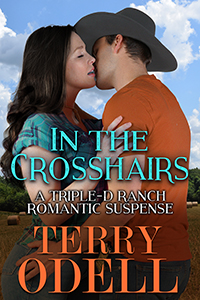R.U.E. Pitfalls
Terry Odell
 A comment by Garry Rodgers to one of Debbie Burke’s posts a while back made me check the archives. I thought for sure I’d written a TKZ post on the subject of R.U.E., but apparently I hadn’t.
A comment by Garry Rodgers to one of Debbie Burke’s posts a while back made me check the archives. I thought for sure I’d written a TKZ post on the subject of R.U.E., but apparently I hadn’t.
When I starting playing around with writing, I belonged to an in person critique group (The Pregnant Pigs, but that’s irrelevant here) and we normally worked with hard copies of our chapters. I was the novice in the group, and my chapters often came back with RUE sprinkled through the pages.
What did that mean? “Resist the Urge to Explain,” they said. “What was I doing wrong?” I asked. And they proceeded to tell me.
As authors, we want to make sure our reader’s “get it,” so we tend to go overboard with information, explaining far too much.
Here’s a simple example: “Mary laughed so hard, she was afraid she’d pulled a stomach muscle. Susie had just told the funniest joke Mary had ever heard.” The second sentence isn’t needed; it’s explaining something the reader would be able to figure out in context.
Another pitfall—telling something, then going on to show it. Let’s say you’re beginning to understand the “show don’t tell” advice everyone gives you, and you put the action on the page. For the sake of example, a simplistic passage might be written as follows:
After Bill cancelled their date, claiming his aunt was sick, Mary was depressed. She took one bite of chocolate cake, then pushed the plate away.
The second sentence shows what the first tells. If you find this in your writing, use your delete key on that first sentence. A better approach:
Mary had been looking forward to her date with Bill for weeks, but he’d cancelled, giving some excuse about a sick aunt. She moved the chocolate cake around the plate with her fork, then pushed it away.
The reader gets the information, and can see that Mary’s depressed without having to be told. You can use the same to show other emotions. Maybe Mary was angry, not depressed, after Bill cancelled. Maybe she throws the whole cake against the wall.
What about this?
Mary’s feet felt like lead. She couldn’t run fast enough to escape the man chasing behind her.
Cut the first sentence. You don’t need both. What about: Mary ran, but her feet refused to move fast enough to escape the man chasing her. Or, Mary’s feet moved as though encased in lead shoes.
Sometimes, we tell the reader too much.
Mary twirled up two strands of spaghetti and waited for the excess sauce to drip onto her plate. Leaning forward, she manipulated the fork into her mouth, then wiped her mouth with her napkin. She was a very careful eater because she hated getting stains on her clothes.
Don’t insult your reader with the last sentence. No need to explain. We can see for ourselves Mary is a meticulous eater.
Another common place writers need to Resist the Urge to Explain is in dialogue. Too often, we tack on tags or beats that tell the reader what the dialogue has already shown. Are you adding adverbs to your dialogue tags?
“I’m sorry,” Tom said apologetically.
Those adverbs are usually signals that you’re telling something the dialogue should be showing. They’re propping up your dialogue, and if it needs propping, it wasn’t strong enough to begin with. All that ‘scaffolding’ merely calls attention to the weak structure beneath.
Will your reader notice these differences? Probably not, but they might not enjoy the read even if they can’t explain why. However, agents and editors are tuned into them, and if you’re submitting, you don’t want to send up any red flags.
Even for experience authors, it’s easy to fall into these traps in early drafts. Some tips:
Check your manuscript for ‘emotion’ words, especially if they’re preceded by “was” or include “felt.” Are you describing your character’s feelings? Don’t tell us how your character feels. Show us.
Check your dialogue tags and beats. Are they consistent with the words being spoken? If so, you don’t need them. If not, your readers will be confused, trying to reconcile dialogue with the action.
Readers are smart. Don’t patronize them by ‘talking down’ to them.
What about you, TKZers? How do you avoid “overselling” in your manuscripts?
Any encounters of RUE from other authors that slog the read?
 Available Now. In the Crosshairs, Book 4 in my Triple-D Romantic Suspense series.
Available Now. In the Crosshairs, Book 4 in my Triple-D Romantic Suspense series.
Changing Your Life Won’t Make Things Easier
There’s more to ranch life than minding cattle. After his stint as an army Ranger, Frank Wembly loves the peaceful life as a cowboy.
Financial advisor Kiera O’Leary sets off to pursue her dream of being a photographer until a car-meets-cow incident forces a shift in plans. Instead, she finds herself in the middle of a mystery, one with potentially deadly consequences.
Terry Odell is an award-winning author of Mystery and Romantic Suspense, although she prefers to think of them all as “Mysteries with Relationships.” Follow her on Facebook and Twitter.
